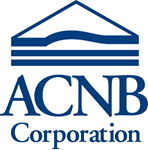-
ACNB Corporation Announces First Quarter Cash Dividend
来源: Nasdaq GlobeNewswire / 24 1月 2024 06:05:00 America/Los_Angeles
GETTYSBURG, Pa., Jan. 24, 2024 (GLOBE NEWSWIRE) -- ACNB Corporation (NASDAQ: ACNB), financial holding company for ACNB Bank and ACNB Insurance Services, Inc., announced today that the Board of Directors approved and declared a regular quarterly cash dividend of $0.30 per share of ACNB Corporation common stock payable on March 15, 2024, to shareholders of record as of March 1, 2024. This per share amount reflects a 7.1% increase over the same quarter of 2023 and will result in aggregate dividend payments of nearly $2.6 million to ACNB Corporation shareholders in the first quarter of 2024. Compared to a year ago, ACNB Corporation paid a $0.28 dividend per common share in the first quarter of 2023. This action marks the Corporation’s 165th consecutive quarterly cash dividend to shareholders since its formation in 1982.
ACNB Corporation, headquartered in Gettysburg, PA, is the independent $2.4 billion financial holding company for the wholly-owned subsidiaries of ACNB Bank, Gettysburg, PA, and ACNB Insurance Services, Inc., Westminster, MD. Originally founded in 1857, ACNB Bank serves its marketplace with banking and wealth management services, including trust and retail brokerage, via a network of 26 community banking offices and three loan offices located in the Pennsylvania counties of Adams, Cumberland, Franklin, Lancaster and York and the Maryland counties of Baltimore, Carroll and Frederick. ACNB Insurance Services, Inc. is a full-service insurance agency with licenses in 44 states. The agency offers a broad range of property, casualty, health, life and disability insurance serving personal and commercial clients through office locations in Westminster and Jarrettsville, MD, and Gettysburg, PA. For more information regarding ACNB Corporation and its subsidiaries, please visit investor.acnb.com.
FORWARD-LOOKING STATEMENTS - In addition to historical information, this press release may contain forward-looking statements. Examples of forward-looking statements include, but are not limited to, (a) projections or statements regarding future earnings, expenses, net interest income, other income, earnings or loss per share, asset mix and quality, growth prospects, capital structure, and other financial terms, (b) statements of plans and objectives of Management or the Board of Directors, and (c) statements of assumptions, such as economic conditions in the Corporation’s market areas. Such forward-looking statements can be identified by the use of forward-looking terminology such as “believes”, “expects”, “may”, “intends”, “will”, “should”, “anticipates”, or the negative of any of the foregoing or other variations thereon or comparable terminology, or by discussion of strategy. Forward-looking statements are subject to certain risks and uncertainties such as national, regional and local economic conditions, competitive factors, and regulatory limitations. Actual results may differ materially from those projected in the forward-looking statements. Such risks, uncertainties, and other factors that could cause actual results and experience to differ from those projected include, but are not limited to, the following: short-term and long-term effects of inflation and rising costs on the Corporation, customers and economy; effects of governmental and fiscal policies, as well as legislative and regulatory changes; effects of new laws and regulations (including laws and regulations concerning taxes, banking, securities and insurance) and their application with which the Corporation and its subsidiaries must comply; impacts of the capital and liquidity requirements of the Basel III standards; effects of changes in accounting policies and practices, as may be adopted by the regulatory agencies, as well as the Financial Accounting Standards Board and other accounting standard setters; ineffectiveness of the business strategy due to changes in current or future market conditions; future actions or inactions of the United States government, including the effects of short-term and long-term federal budget and tax negotiations and a failure to increase the government debt limit or a prolonged shutdown of the federal government; effects of economic conditions particularly with regard to the negative impact of any pandemic, epidemic or health-related crisis and the responses thereto on the operations of the Corporation and current customers, specifically the effect of the economy on loan customers’ ability to repay loans; effects of competition, and of changes in laws and regulations on competition, including industry consolidation and development of competing financial products and services; inflation, securities market and monetary fluctuations; risks of changes in interest rates on the level and composition of deposits, loan demand, and the values of loan collateral, securities, and interest rate protection agreements, as well as interest rate risks; difficulties in acquisitions and integrating and operating acquired business operations, including information technology difficulties; challenges in establishing and maintaining operations in new markets; effects of technology changes; effects of general economic conditions and more specifically in the Corporation’s market areas; failure of assumptions underlying the establishment of reserves for loan losses and estimations of values of collateral and various financial assets and liabilities; acts of war or terrorism or geopolitical instability; disruption of credit and equity markets; ability to manage current levels of impaired assets; loss of certain key officers; ability to maintain the value and image of the Corporation’s brand and protect the Corporation’s intellectual property rights; continued relationships with major customers; and, potential impacts to the Corporation from continually evolving cybersecurity and other technological risks and attacks, including additional costs, reputational damage, regulatory penalties, and financial losses. We caution readers not to place undue reliance on these forward-looking statements. They only reflect Management’s analysis as of this date. The Corporation does not revise or update these forward-looking statements to reflect events or changed circumstances. Please carefully review the risk factors described in other documents the Corporation files from time to time with the SEC, including the Annual Reports on Form 10-K and Quarterly Reports on Form 10-Q. Please also carefully review any Current Reports on Form 8-K filed by the Corporation with the SEC.
ACNB #2024-2
January 24, 2024Contact: Kevin J. Hayes SVP/General Counsel, Secretary & Chief Governance Officer 717.339.5161 khayes@acnb.com 
